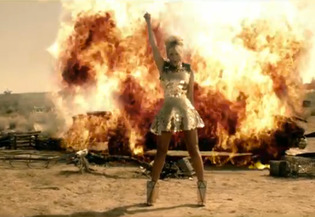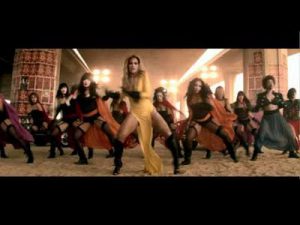by Stephanie Cole
 My last two weeks of my college experience between finals and graduation were incredibly hectic. Ceremonies and impromptu celebrations reigned, and the general emotional overload gave me little time to really examine what my four years at a Women’s College has meant for me.
My last two weeks of my college experience between finals and graduation were incredibly hectic. Ceremonies and impromptu celebrations reigned, and the general emotional overload gave me little time to really examine what my four years at a Women’s College has meant for me.
However, on the night before graduation, my friends helped prompt my thinking. One of them asked if any of us had heard Beyonce’s brand new song “Run The World (Girls),” which she said was eerily Mount Holyoke-relevant. We watched the video on YouTube, and then we broke it down. It was obvious that my time at Mount Holyoke taught me about feminism.
Beyonce’s new single is presented as a feminist anthem. An analysis of every song should begin with the musical component, and I think Beyonce’s overreliance on a Major Lazer sample, causes it to fail in this department. Sampling as a popular music tool can be effective, but it has gotten a little out of hand lately. In this case, sample has turned into primary instrumentation so there is very little originality left. The abundant sampling contradicts the song’s message, too. If a woman has the power to rule the world, can’t she at least come up with an original beat? Why does she have to borrow from two men?
And what about the lyrics? Do they at least succeed at delivering a pro-women message? Initially, I tried to be forgiving. I understood that Beyonce doesn’t write her own songs, and that she probably had good intentions when she chose the material. But the lyrics do present problems. They promote feminine power and respect for women, but they never venture beyond empty “girl power.” There is little in the way of action or solutions offered, or even any acknowledgment that patriarchy persists.
Vlogger 19precent does a great job of breaking down Beyonce’s song, and I agree with most of her points. The lyrics can alternatively be understood as an act of positive self-empowerment, but they still remain far too focused on materialism and sex. Beyonce’s criteria for feminine empowerment seem to be entirely based in how much money a woman makes, and how well she can use her sexuality to gain persuasion over men. Financial independence and empowering sexuality are important, but they are not the only aspect of feminism that should be emphasised, and they are decidedly slanted towards the experience of upper middle class women in the western world.
 The music video further complicates the effects of “Run the World (Girls).” A Jezebel article argues persuasively that much of its imagery has been appropriated form the work of photographer Pieter Hugo. So once again, the artistry on display has been borrowed from a male source. Some of the choreography is good, and I think the gradually increasing size of Beyonce’s army of women is compelling. But the amount of sex on display is problematic. I believe powerful expressions of female sexuality should never be stigmatised or restricted, and some sexuality certainly has a place within a piece of feminist art. However, I have a problem with the corsets, garters and fishnets worn by the army of women as they face down fully clothed men. There is certainly a sexy that falls between full body armor and corsets, and I am disappointed that the sexy on display here is so cliché.
The music video further complicates the effects of “Run the World (Girls).” A Jezebel article argues persuasively that much of its imagery has been appropriated form the work of photographer Pieter Hugo. So once again, the artistry on display has been borrowed from a male source. Some of the choreography is good, and I think the gradually increasing size of Beyonce’s army of women is compelling. But the amount of sex on display is problematic. I believe powerful expressions of female sexuality should never be stigmatised or restricted, and some sexuality certainly has a place within a piece of feminist art. However, I have a problem with the corsets, garters and fishnets worn by the army of women as they face down fully clothed men. There is certainly a sexy that falls between full body armor and corsets, and I am disappointed that the sexy on display here is so cliché.
When the sheer amount of blatant misogyny present in popular music today is considered, I find some virtue in Beyonce’s effort. But all my positive feelings towards the song are solely based on the fact that it could have been worse. I’m glad “Run the World (Girls)” could take away some air time from an objectifying or violent song, but I fear that it could add to the false idea that we live in a post-sexism age. I would encourage everyone to follow SPARK, as well as the important work being done at other feminist organisations, so that people can understand that sexism still prevails in the United States. I would also suggest that men and women read Half the Sky by Nicholas D. Kristof and Sheryl WuDunn. It is an amazing book that makes it clear that women do not, in fact, rule the world. But it offers wonderful stories of action and hope.
Sorry Beyonce, but it’s this kind of awareness that is needed to truly, effectively empower girls.
I have noticed that though out her video her complexion and hair becomes lighter and lighter so that by the end of the video she looks like a white woman. Beyonce is a queen at performance but a disappointment when it comes to content of lyrics and imagery. To end begin the video looking latin and end it looking white states to me that if girls do run the world it is conditional.
And truthfully from a feminine perspective it is not about running the world but how the world is run. Women come from a community perspective and energy which is dominated by sharing and nurturing not taking over and aggression. I know this video is a throw back to Tina Turner Beyond Thunder Dome but the even the feminist movement has progressed since that movie. The movement has evolved to the truest way of being as women on this planet and this evolution is not in anyway captured in her video, lyric or presentation.
Working together with men in a collective community is what holds the brightness of our human revolution. Self acceptance , love , compassion and unity is how women will continue to rise. Allow men to see and experience out truest nature and encouraging them to advocate this to other men is how the world is to be run.
He video suggests not only using sexuality and appearance and aggression to run the world but separation and competition. This is not the feminine way of being but a duplication of the masculine energy that continues to run the world. And as long as we continue to play the mans game we will continue to have more of the same!
Beyonce with your platform and popularity I am certain you can carry a truly powerful message .. the message of empowerment and community.
This has engendered a lot of publicity for Beyonce. I have not seen or heard it, but I have heard a lot about it. I am proud that Stephanie shows a good deal of common sense about women in the world today. Beyonce could do much to empower women if she were to go about it in the right way.